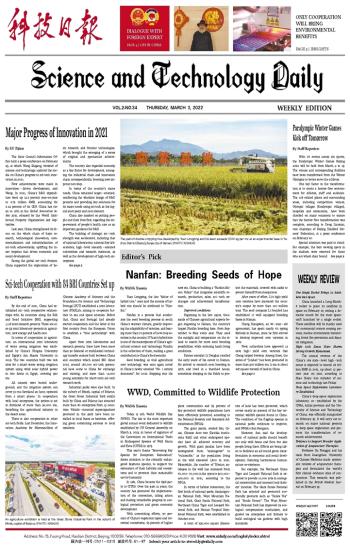
Today is 9th World Wildlife Day (WWD). The day is the most important global annual event dedicated to wildlife established by UN General Assembly on March 3, 2013, in honor of signature of the Convention on International Trade in Endangered Species of Wild Fauna and Flora (CITES) in 1973.
This year's theme "Recovering Key Species for Ecosystem Restoration" draws attention to the critically endangered keystone species, to support the restoration of their habitats and ecosystems and to promote their sustainable use by humanity.
In 1981, China became the 63rd party to CITES. Over the past 41 years, the country has promoted the implementation of the convention, taking action and making remarkable progress in ecological protection and green economic development.
With unremitting efforts, 90 percent of China's vegetation types and terrestrial ecosystems, 65 percent of higher plant communities and 85 percent of key protected wildlife populations have been effectively protected, according to the National Forestry and Grassland Administration (NFGA).
The giant panda, crested ibis, Cycas, Chinese dove tree (Davidia involucrata Baill) and other endangered species have all achieved recovery and growth. Wild giant pandas have been downgraded from "endangered" to "vulnerable," as the population living in the wild exceeded 1,800 in 2021. Meanwhile, the number of Tibetan antelopes in the wild has increased from 60,000 - 70,000 in the 1990s to 300,000 - 400,000 in 2021, according to the NFGA.
In terms of habitat restoration, the first batch of national parks, Sanjiangyuan National Park, Wuyi Mountain National Park, Giant Panda National Park, Northeast China Tiger and Leopard National Park, and Hainan Tropical Rainforest National Park, were established in October 2021.
A total of 230,000 square kilometers of land has been protected, which covers nearly 30 percent of the key terrestrial wildlife species found in China. The condition of the flagship species in national parks continues to improve, said NFGA's Sun Hongyan.
However, Sun said the development of national parks should benefit not only wild fauna and flora but also people living there. Efforts are being taken to facilitate an all-round green transformation in economic and social development, featuring harmonious human-nature co-existence.
For example, the Northeast China Tiger and Leopard National Park is expected to provide 10,000 jobs in ecological conservation and increase local farmers' incomes. The Giant Panda National Park has selected and promoted eco-friendly products such as "Panda Tea" and "Panda Honey". The Wuyi Mountain National Park has improved its ecological compensation mechanism, and guided tea enterprises and farmers to build ecological tea gardens with high standards.

 Next
Next




